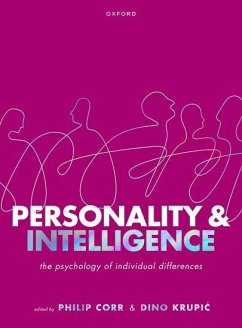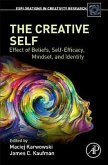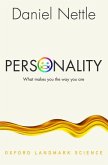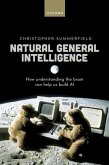Dr Philip Corr (Professor of Psychology, Professor of Psychology, C, Dr Dino Krupic (Assistant Profes Assistant Professor of Psychology
Personality and Intelligence
The Psychology of Individual Differences
Dr Philip Corr (Professor of Psychology, Professor of Psychology, C, Dr Dino Krupic (Assistant Profes Assistant Professor of Psychology
Personality and Intelligence
The Psychology of Individual Differences
- Broschiertes Buch
- Merkliste
- Auf die Merkliste
- Bewerten Bewerten
- Teilen
- Produkt teilen
- Produkterinnerung
- Produkterinnerung
With its real-world focus and comprehensive coverage, this text encourages students to take a critical approach to the psychology of individual differences. It pairs foundational theory with contemporary research insights, weaving conceptual and social issues throughout, to offer a thorough insight into this stimulating field.
Andere Kunden interessierten sich auch für
![The Creative Self The Creative Self]() The Creative Self70,99 €
The Creative Self70,99 €![Personality Personality]() Daniel Nettle ( Reader in Psychology at the University of NewcastlePersonality14,99 €
Daniel Nettle ( Reader in Psychology at the University of NewcastlePersonality14,99 €![Natural General Intelligence Natural General Intelligence]() Christopher Summerfield (Uni Department of Experimental PsychologyNatural General Intelligence84,99 €
Christopher Summerfield (Uni Department of Experimental PsychologyNatural General Intelligence84,99 €![The History of Emotions: A Very Short Introduction The History of Emotions: A Very Short Introduction]() Thomas Dixon (Queen Mary University of London)The History of Emotions: A Very Short Introduction13,99 €
Thomas Dixon (Queen Mary University of London)The History of Emotions: A Very Short Introduction13,99 €![Borderline Personality Disorder Borderline Personality Disorder]() Roy Krawitz (therapist Psychiatrist and consultant in the area ofBorderline Personality Disorder19,99 €
Roy Krawitz (therapist Psychiatrist and consultant in the area ofBorderline Personality Disorder19,99 €![Plant Behaviour and Intelligence Plant Behaviour and Intelligence]() Anthony Trewavas (Emeritus Professor, Emeritus Professor, UniversitPlant Behaviour and Intelligence58,99 €
Anthony Trewavas (Emeritus Professor, Emeritus Professor, UniversitPlant Behaviour and Intelligence58,99 €![From Personality to Virtue From Personality to Virtue]() From Personality to Virtue110,99 €
From Personality to Virtue110,99 €-
-
-
With its real-world focus and comprehensive coverage, this text encourages students to take a critical approach to the psychology of individual differences. It pairs foundational theory with contemporary research insights, weaving conceptual and social issues throughout, to offer a thorough insight into this stimulating field.
Hinweis: Dieser Artikel kann nur an eine deutsche Lieferadresse ausgeliefert werden.
Hinweis: Dieser Artikel kann nur an eine deutsche Lieferadresse ausgeliefert werden.
Produktdetails
- Produktdetails
- Verlag: Oxford University Press
- Seitenzahl: 704
- Erscheinungstermin: 23. April 2024
- Englisch
- Abmessung: 196mm x 265mm x 31mm
- Gewicht: 1486g
- ISBN-13: 9780198811398
- ISBN-10: 019881139X
- Artikelnr.: 68715081
- Herstellerkennzeichnung
- Libri GmbH
- Europaallee 1
- 36244 Bad Hersfeld
- 06621 890
- Verlag: Oxford University Press
- Seitenzahl: 704
- Erscheinungstermin: 23. April 2024
- Englisch
- Abmessung: 196mm x 265mm x 31mm
- Gewicht: 1486g
- ISBN-13: 9780198811398
- ISBN-10: 019881139X
- Artikelnr.: 68715081
- Herstellerkennzeichnung
- Libri GmbH
- Europaallee 1
- 36244 Bad Hersfeld
- 06621 890
Dr Philip Corr is Professor of Psychology at City, University of London, and Honorary Professor at Brunel University. His research focuses on personality and individual differences, encompassing psychometric, behavioural and neuroscience approaches - he has extensive teaching experience in these areas. Philip is the Founding Editor of Journal Personality Neuroscience, published by Cambridge University Press, and has served as President of several scientific societies dedicated to the psychology of individual differences. Dr Dino Krupi¿ is a Professor at the Department of Psychology at the University of Osijek, Croatia, where he lectures on personality psychology, applied methodology and psychometrics. His main scientific interest is the biological basis of personality, with a particular focus on the study of fear and anxiety in laboratory settings. He is a member of the International Society for the Study of Individual Differences (ISSID) and the European Association of Personality Psychology (EAPP).
* Overview and route map * PART ONE: PERSONALITY * Introduction to Part One * Section I: Conceptual and Historical Foundations * 1: Philip J. Corr, Dino Krupi
: Introduction to Personality Psychology: Where it Began, and Why * 2: Philip J. Corr, Dino Krupi
: Psychodynamic Theory: Historical Perspective and Evaluation * 3: Philip J. Corr, Dino Krupi
: Behavioural and Cognitive Perspectives: Contrasts and Similarities * 4: Brent Dean Robbins: The Humanistic Challenge * Section II: Traits and States * 5: Mägorzata Fajkowska, Eranda Jayawickreme: Integrating Trait Structures and State Processes * 6: Boele De Raad, Boris Mläi
, Dick Barelds: Structural Trait Models * 7: Rainer Reisenzein, Philip J. Corr, Dino Krupi
: Motivation, Emotion and Personality * Section III: Psychological Processes * 8: Michael D. Robinson, Michelle R. P. Durham: Cognitive Processes * 9: John F. Rauthmann, Manfred Schmitt: Social Processes * 10: Ceren Gunsoy: Society, Culture and Self * Section IV: Developmental and Biological Bases * 11: Abigail C. Heller, Lauri A. Jensen-Campbell: Childhood Temperament and Life-span Development * 12: Marieke C. Gartner: Comparative Animal Personality * 13: Jan Wacker, Colin G. DeYoung, Erik M. Mueller: Personality Neuroscience * PART TWO: INTELLIGENCE * Introduction to Part Two * Section I: Factors and Measurement * 14: Roberto Colom, Kenia Martínez: Introduction to Intelligence: Conceptual Foundations * 15: Nicolas Becker, Jörn R. Sparfeldt: Factor Models * 16: Johanna Hartung, Oliver Wilhelm: Tests of Cognitive Ability and Intelligence * Section II: Approaches to Causation * 17: Frank M. Spinath, Juliana Gottschling: Genetics and Environmental Models * 18: Stefan Troche, Karl Schweizer: Experimental and Neuroscience Approaches * 19: Sarah K. Davis, Blaire Morgan, Bérénice Mahoney: Educational and Cognitive Perspectives * PART THREE: APPLICATIONS * Introduction to Part Three * 20: Dino Krupi
, Philip J. Corr, Liam P. Satchell: Personality Assessment: Methods, Data, and Interpretation * 21: Philip J. Corr, Dino Krupi
: Psychometrics, Reliability, Validity and Factor Analysis * 22: Liam P. Satchell, Philip J. Corr, Dino Krupi
: Personality and Intelligence: Context, Controversy, and Challenge
: Introduction to Personality Psychology: Where it Began, and Why * 2: Philip J. Corr, Dino Krupi
: Psychodynamic Theory: Historical Perspective and Evaluation * 3: Philip J. Corr, Dino Krupi
: Behavioural and Cognitive Perspectives: Contrasts and Similarities * 4: Brent Dean Robbins: The Humanistic Challenge * Section II: Traits and States * 5: Mägorzata Fajkowska, Eranda Jayawickreme: Integrating Trait Structures and State Processes * 6: Boele De Raad, Boris Mläi
, Dick Barelds: Structural Trait Models * 7: Rainer Reisenzein, Philip J. Corr, Dino Krupi
: Motivation, Emotion and Personality * Section III: Psychological Processes * 8: Michael D. Robinson, Michelle R. P. Durham: Cognitive Processes * 9: John F. Rauthmann, Manfred Schmitt: Social Processes * 10: Ceren Gunsoy: Society, Culture and Self * Section IV: Developmental and Biological Bases * 11: Abigail C. Heller, Lauri A. Jensen-Campbell: Childhood Temperament and Life-span Development * 12: Marieke C. Gartner: Comparative Animal Personality * 13: Jan Wacker, Colin G. DeYoung, Erik M. Mueller: Personality Neuroscience * PART TWO: INTELLIGENCE * Introduction to Part Two * Section I: Factors and Measurement * 14: Roberto Colom, Kenia Martínez: Introduction to Intelligence: Conceptual Foundations * 15: Nicolas Becker, Jörn R. Sparfeldt: Factor Models * 16: Johanna Hartung, Oliver Wilhelm: Tests of Cognitive Ability and Intelligence * Section II: Approaches to Causation * 17: Frank M. Spinath, Juliana Gottschling: Genetics and Environmental Models * 18: Stefan Troche, Karl Schweizer: Experimental and Neuroscience Approaches * 19: Sarah K. Davis, Blaire Morgan, Bérénice Mahoney: Educational and Cognitive Perspectives * PART THREE: APPLICATIONS * Introduction to Part Three * 20: Dino Krupi
, Philip J. Corr, Liam P. Satchell: Personality Assessment: Methods, Data, and Interpretation * 21: Philip J. Corr, Dino Krupi
: Psychometrics, Reliability, Validity and Factor Analysis * 22: Liam P. Satchell, Philip J. Corr, Dino Krupi
: Personality and Intelligence: Context, Controversy, and Challenge
* Overview and route map * PART ONE: PERSONALITY * Introduction to Part One * Section I: Conceptual and Historical Foundations * 1: Philip J. Corr, Dino Krupi
: Introduction to Personality Psychology: Where it Began, and Why * 2: Philip J. Corr, Dino Krupi
: Psychodynamic Theory: Historical Perspective and Evaluation * 3: Philip J. Corr, Dino Krupi
: Behavioural and Cognitive Perspectives: Contrasts and Similarities * 4: Brent Dean Robbins: The Humanistic Challenge * Section II: Traits and States * 5: Mägorzata Fajkowska, Eranda Jayawickreme: Integrating Trait Structures and State Processes * 6: Boele De Raad, Boris Mläi
, Dick Barelds: Structural Trait Models * 7: Rainer Reisenzein, Philip J. Corr, Dino Krupi
: Motivation, Emotion and Personality * Section III: Psychological Processes * 8: Michael D. Robinson, Michelle R. P. Durham: Cognitive Processes * 9: John F. Rauthmann, Manfred Schmitt: Social Processes * 10: Ceren Gunsoy: Society, Culture and Self * Section IV: Developmental and Biological Bases * 11: Abigail C. Heller, Lauri A. Jensen-Campbell: Childhood Temperament and Life-span Development * 12: Marieke C. Gartner: Comparative Animal Personality * 13: Jan Wacker, Colin G. DeYoung, Erik M. Mueller: Personality Neuroscience * PART TWO: INTELLIGENCE * Introduction to Part Two * Section I: Factors and Measurement * 14: Roberto Colom, Kenia Martínez: Introduction to Intelligence: Conceptual Foundations * 15: Nicolas Becker, Jörn R. Sparfeldt: Factor Models * 16: Johanna Hartung, Oliver Wilhelm: Tests of Cognitive Ability and Intelligence * Section II: Approaches to Causation * 17: Frank M. Spinath, Juliana Gottschling: Genetics and Environmental Models * 18: Stefan Troche, Karl Schweizer: Experimental and Neuroscience Approaches * 19: Sarah K. Davis, Blaire Morgan, Bérénice Mahoney: Educational and Cognitive Perspectives * PART THREE: APPLICATIONS * Introduction to Part Three * 20: Dino Krupi
, Philip J. Corr, Liam P. Satchell: Personality Assessment: Methods, Data, and Interpretation * 21: Philip J. Corr, Dino Krupi
: Psychometrics, Reliability, Validity and Factor Analysis * 22: Liam P. Satchell, Philip J. Corr, Dino Krupi
: Personality and Intelligence: Context, Controversy, and Challenge
: Introduction to Personality Psychology: Where it Began, and Why * 2: Philip J. Corr, Dino Krupi
: Psychodynamic Theory: Historical Perspective and Evaluation * 3: Philip J. Corr, Dino Krupi
: Behavioural and Cognitive Perspectives: Contrasts and Similarities * 4: Brent Dean Robbins: The Humanistic Challenge * Section II: Traits and States * 5: Mägorzata Fajkowska, Eranda Jayawickreme: Integrating Trait Structures and State Processes * 6: Boele De Raad, Boris Mläi
, Dick Barelds: Structural Trait Models * 7: Rainer Reisenzein, Philip J. Corr, Dino Krupi
: Motivation, Emotion and Personality * Section III: Psychological Processes * 8: Michael D. Robinson, Michelle R. P. Durham: Cognitive Processes * 9: John F. Rauthmann, Manfred Schmitt: Social Processes * 10: Ceren Gunsoy: Society, Culture and Self * Section IV: Developmental and Biological Bases * 11: Abigail C. Heller, Lauri A. Jensen-Campbell: Childhood Temperament and Life-span Development * 12: Marieke C. Gartner: Comparative Animal Personality * 13: Jan Wacker, Colin G. DeYoung, Erik M. Mueller: Personality Neuroscience * PART TWO: INTELLIGENCE * Introduction to Part Two * Section I: Factors and Measurement * 14: Roberto Colom, Kenia Martínez: Introduction to Intelligence: Conceptual Foundations * 15: Nicolas Becker, Jörn R. Sparfeldt: Factor Models * 16: Johanna Hartung, Oliver Wilhelm: Tests of Cognitive Ability and Intelligence * Section II: Approaches to Causation * 17: Frank M. Spinath, Juliana Gottschling: Genetics and Environmental Models * 18: Stefan Troche, Karl Schweizer: Experimental and Neuroscience Approaches * 19: Sarah K. Davis, Blaire Morgan, Bérénice Mahoney: Educational and Cognitive Perspectives * PART THREE: APPLICATIONS * Introduction to Part Three * 20: Dino Krupi
, Philip J. Corr, Liam P. Satchell: Personality Assessment: Methods, Data, and Interpretation * 21: Philip J. Corr, Dino Krupi
: Psychometrics, Reliability, Validity and Factor Analysis * 22: Liam P. Satchell, Philip J. Corr, Dino Krupi
: Personality and Intelligence: Context, Controversy, and Challenge








